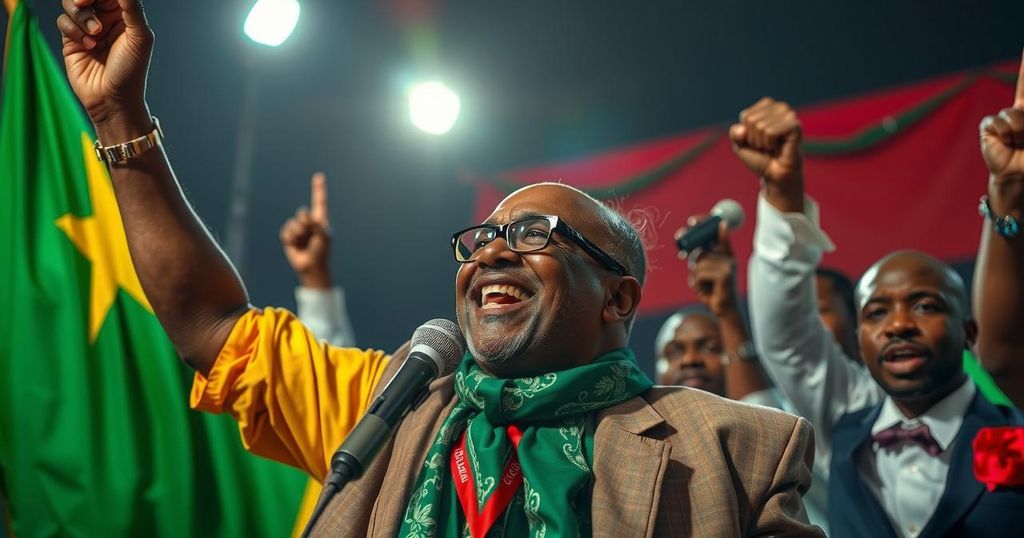Global news
ABD, ABDIRAHMAN MOHAMED ABDULLAHI, ABDULLAHI, AFRICA, AL-SHABAAB, AP, COMMISSION, DIPLOMACY, DIPLOMATIC RELATIONS, DJIBOUTI, ETHIOPIA, HASSAN ALI KHAIRE, INDIAN OCEAN, ISMAIL OMAR GUELLEH, MOGADISHU, MOHAMED HUSEIN GAAS, MUSE BIHI ABDI, RAAD PEACE RESEARCH INSTITUTE, REGIONAL COOPERATION, REGIONAL SECURITY, SOMALIA, SOMALILAND, THE ASSOCIATED PRESS, WADDANI PARTY
Isaac Bennett
0 Comments
Somaliland Opposition Leader Abdirahman Abdullahi Wins Presidential Election
Abdirahman Mohamed Abdullahi of the Waddani Party won Somaliland’s presidential election with over 50% of the vote, defeating the incumbent Muse Bihi Abdi. The election outcome reflects a demand for reforms and economic focus. Somaliland maintains a stable governance model since declaring independence from Somalia in 1991, despite lacking international recognition. The election may influence ongoing relations with Somalia and Ethiopia.
The recent presidential election in Somaliland resulted in a significant victory for Abdirahman Mohamed Abdullahi, the leader of the opposition Waddani Party. According to the electoral commission’s announcement, Abdullahi secured over 50% of the votes, surpassing President Muse Bihi Abdi of the ruling Kulmiye Party, who received slightly more than 30%. The opposition’s campaign focused on advocating for democratic reforms and addressing economic challenges, including youth unemployment. Notably, Abdullahi served as the speaker of Somaliland’s parliament in 2005, highlighting his political experience. The election had been delayed twice since 2022 due to funding issues and other factors. Somaliland, which proclaimed its independence from Somalia in 1991, has maintained its own governance, economy, and security systems, despite lacking formal international recognition. The region has developed a comparatively stable political climate, distinct from the ongoing security issues faced by Somalia. Recently, a controversial agreement with Ethiopia granting Somaliland access to the Indian Ocean has intensified political tensions with Somalia, as the latter’s leaders accuse Ethiopia of posing a threat to its territorial integrity. The Waddani Party has critiqued the lack of clear economic advantages from this agreement. Following the election results, leaders from Somalia have expressed hopes for improved relations with Somaliland. Former Somali Prime Minister Hassan Ali Khaire shared his aspirations on social media, expressing a desire for the new administration to guide the region toward “peace, development, and democracy, and to foster unity among the Somali people.” Djibouti’s President Ismail Omar Guelleh also extended congratulations to Somaliland’s president-elect, reflecting a broader regional interest in the developments within Somaliland.
Somaliland declared independence from Somalia in 1991, amidst significant conflict that plagued the region. Despite lacking international recognition, it has built robust institutions, including its government and security forces, while establishing a unique identity apart from Somalia. The recent election is a pivot in Somaliland’s political landscape, reflecting a growing desire for reforms and economic stability, especially in light of ongoing tensions with Somalia and Ethiopia. These elements create a backdrop against which the leadership transition will occur, potentially shaping relations both locally and internationally.
The election of Abdirahman Mohamed Abdullahi marks a pivotal moment for Somaliland, underscoring the electorate’s demand for economic progress and democratic reforms. This change could represent a new chapter in Somaliland’s quest for international recognition and stability, amidst regional complexities and historical tensions. As leaders within the broader Somali context respond to these developments, the prospects for reconciliation and relationship-building appear promising, indicating a potential shift towards cooperative governance and regional solidarity.
Original Source: www.seattletimes.com




Post Comment